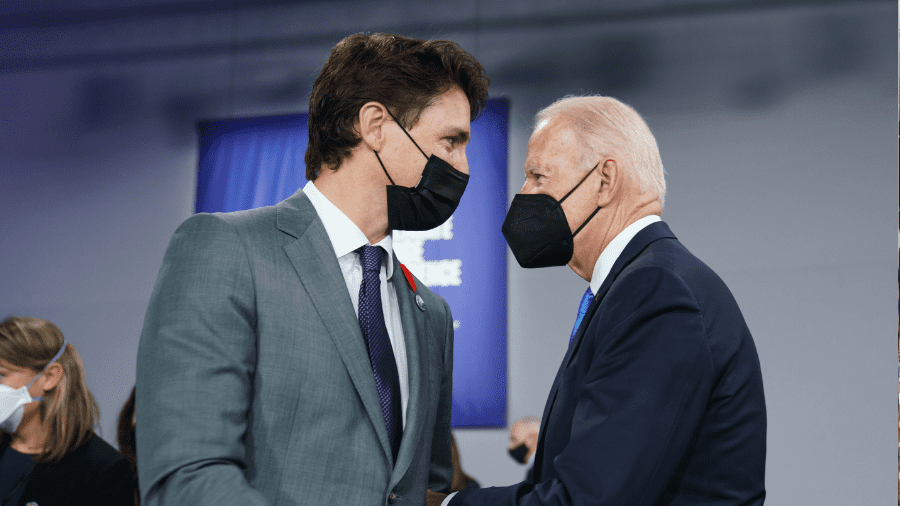By Michael Barutciski, February 10, 2023
Reports that New York City is sending asylum seekers towards Roxham Road have understandably shocked Quebecers. The Legault government wants this unofficial crossing to be closed so that it is no longer used by irregular migrants to claim asylum in Quebec. Any sustainable solution to this problem will have to come from the renegotiation of the Canada-US Safe Third Country Agreement (STCA).
The latest controversial development regarding this situation results from an emerging US trend in which overwhelmed southern Republican states send asylum seekers to northern Democrat “sanctuary” cities. This practice will turn into a continental crisis if the cynical logic is extended to neighbouring Canada. It is therefore necessary to grasp the dynamic behind the facade and to convince the US that it also has an interest in renegotiating the STCA.
It may not be obvious from much of the misleading commentary and political statements, but this treaty is simply about responsibility-sharing. It does not oblige Canada to allow illegal crossings. The general idea of the STCA collaborative framework is that the first country of entry would normally assume responsibility for an asylum claim. It does not create new migrant rights.
The initial step to reassure Canadians is for Ottawa to affirm that it is able to control the border. A government cannot suggest to its population that this is an impossible task. There is no need to hermetically secure the entire continent-wide border: a sufficient presence of border officials will help to avoid the impression there is a wide-open gate.
Ottawa also needs a clearer position regarding legal obligations. The government has repeated in the past that the Refugee Convention automatically grants the right to a hearing to every asylum seeker at Roxham Road. After several years of record numbers of asylum seekers accommodated in Quebec, it has discreetly backtracked by claiming that negotiations with the US will solve the problem. In other words, Canada will not be offering an automatic right to a hearing. The RCMP will prevent illegal entry, just as it did during the pandemic-related travel restrictions.
Given the designation of the US as a “safe country,” there is generally no legal reason that the RCMP cannot stop and immediately return a migrant who is trying to enter at Roxham Road. The federal government should publicly explain if US officials on the other side of the border are refusing to collaborate in maintaining order and respect for the law in the Montérégie/Clinton County sector, despite the existence of a binational Action Plan for perimeter security.
Ottawa should also reassure Quebec that it is repeatedly asking US officials on the Clinton County side of the border to prevent illegal entry at Roxham Road and requesting that the migrants be directed to the nearby Montérégie port of entry at Lacolle. The administrative collaboration set up by the STCA was meant to apply specifically at official border crossings, so the migrants would have to stay in the US for their asylum claims. From a Canadian perspective, the STCA needs to be extended to the entire border to provide a clear guarantee that the binational collaboration is not limited to official crossings. This limitation is what incentivizes illegal entry for the purpose of claiming asylum in Canada. Surely, it cannot be an example of principled cooperation on border control or promotion of orderly migration.
Yet many commentators claim that the US has no real interest in addressing this Canadian problem. If the Americans are not maintaining order in the border region, they should be reminded that this is ultimately counter-productive to their own interests. They have a similar problem with Mexico, except that the roles are reversed: Washington would like to convince the Mexicans to better manage the migration flows from Central America. It is therefore necessary to convince the pro-multilateralism Biden administration that Canadian complaints about hypocrisy will undermine its efforts to mobilize Central American countries for a regional solution.
A careful Canadian diplomatic persuasion campaign would involve a two-prong approach: denouncing US hypocrisy when it tries to establish regional coordination with Central America, while offering to share the burden by resettling to Canada refugees stuck in Central American countries. A proposal to off-load the pressure on the US southern border would be welcomed by the White House and would be in line with Canada’s strong commitment to refugee resettlement. It is better to select refugees for resettlement than to manage irregular crossings.
The collaborative approach would also serve as a model for promoting orderly migration. Skeptics are forgetting that the US will ultimately have to defend its push for regional solution with fair principles that can unite different countries with varying interests. As a close partner, Canada can play a constructive role.
In this sense, there is a universal dimension to the Roxham Road problem. If borders were to be managed this way throughout the world, there will be chaos everywhere and the international refugee protection system will collapse. It is not only the Mexican border situation that is relevant, but also the tragic situation that continues on the Mediterranean Sea, the English Channel, etc. If two close partners in North America cannot show leadership by negotiating a solution to the absurd situation at Roxham Road, then there is little hope for the European Union or any other regional bloc dealing with migration challenges.
We all have an interest in maintaining law and order so that all asylum claims can be examined properly and fairly. The reasonable compromise in this situation would be to explain in an upfront manner that migrants will not always get to choose the country responsible for examining their asylum claims. This is the price to pay in order to preserve a principled international protection system and to avoid the popular perception that it is being abused.
Canada does not have many levers in terms of persuading the White House. Given that the current US administration does not want to appear anti-refugee, Canadian diplomats could explore principled arguments to back a collaborative solution.
Michael Barutciski is a faculty member of Glendon College, York University. He has written reports on refugee law/policy and taught the subject in several countries.






